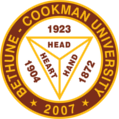Bethune-Cookman University Announces Academic Restructure
DAYTONA BEACH, FL- (July 6, 2020) The Bethune-Cookman University Board of Trustees has unanimously voted in support of a comprehensive overhaul of the University’s academic structure. The Trustees approved the consolidation of the University’s eleven colleges and schools into three colleges. This transition comes upon the recommendation of President E. LaBrent Chrite, following a thorough analysis by a faculty committee under the leadership of Dr. Herbert Thompson, Dean of the College of Science, Engineering and Mathematics. The move reflects the University’s commitment to consolidate critical resources, and more vitally, to articulate through the new structure, an academic enterprise that is more intuitively aligned with B-CU’s academic history and mission. In support of the plan, Belvin Perry, Esq,, Chairman of the B-CU Board of Trustees asserted "This academic restructuring plan will facilitate the next chapter in B-CU's ongoing quest to provide students with a quality educational experience which equips them to be successful in their chosen professions and in their lives."
The three academic entities will include arts and humanities, affirming the University’s history and its commitment to the liberal arts; natural and health sciences, engineering and mathematics, reflecting its focus on STEM and the health sciences and finally, business and entrepreneurship, which remain vital to B-CU students and to the regional and national economy. According to President Chrite, “The proposed structure, in addition to being more agile and market-centered, will enable B-CU to articulate a more focused and less ambiguous value proposition. The intent is to create a structure that is aligned with an academic strategy through which faculty, staff and students can coalesce; it also offers a shared vision for marketplace and academic convergence.” This model will consolidate B-CU’s academic enterprise into functional entities with an emphasis on more efficient operations, strategically aligned transdisciplinary work and stronger academic programs. The new structure will improve accountability as evidenced by performance-based outcomes such as retention and graduation rates, as well as post-graduation employment and placement activities. This model affirms B-CU’s rich academic heritage while also connecting it with the 21st century economic marketplace.
The academic restructuring is the culmination of a remarkable year for the University, during which it was faced with extraordinary challenges. The University slashed millions of dollars in expenses, overhauled and strengthened governance under Board Chair, Judge Belvin Perry, raised a record level of private support and received an unprecedented financial commitment from the State of Florida. The University is furthermore well-positioned to migrate off SACS probation and survive the debilitating hardships of COVID-19. According to Provost Mariella-Walrond, “This new academic structure is more streamlined and coordinated, and will allow more opportunities for collaborations and engagement between students and faculty. It will ultimately foster more creative and collaborative academic efforts.”
The University is planning no elimination of programs at this time as the new structure will more effectively facilitate a broad and rigorous review of the institution’s academic portfolio. Other academic units including the Gale Lemerand School of Nursing, the School of Education, the Bob Billingslea School of Hospitality, the LaDoris McClaney School of Performing Arts and Communication and the School of Religion, for example, will remain distinct entities under the auspices of one of the three colleges. Implementation of the structure will begin immediately and will continue during the upcoming academic year.
